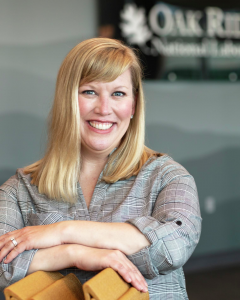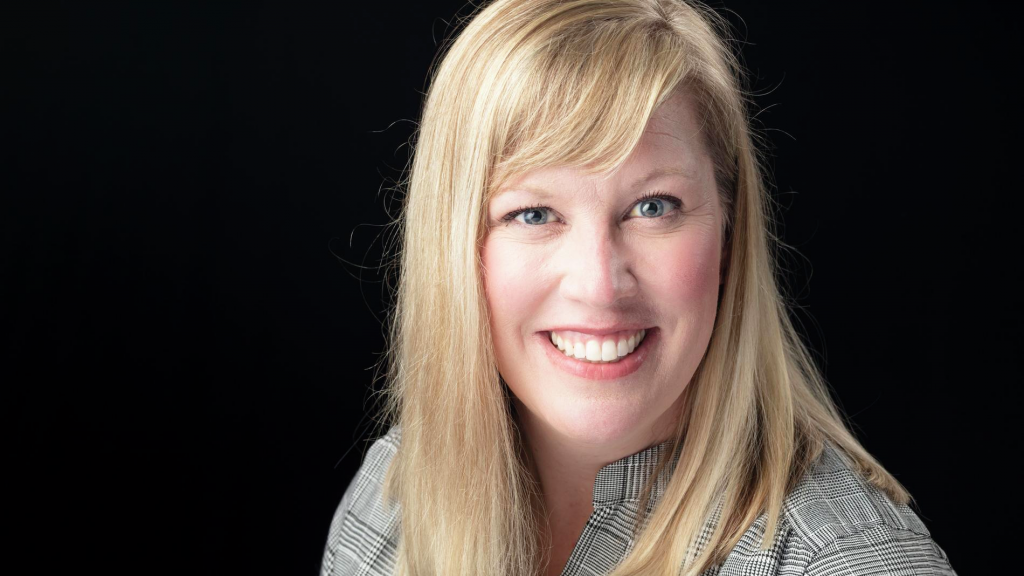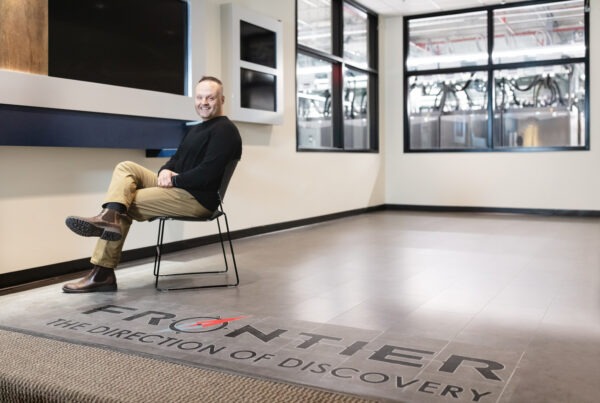The “Pioneering Frontier” series features stories profiling the many talented ORNL employees behind the construction and operation of the OLCF’s incoming exascale supercomputer, Frontier. The HPE Cray system is scheduled for delivery in 2021, with full user operations in 2022.

Denise Hoomes leads the project controls specialists working on the Frontier supercomputer project. Image Credit: Carlos Jones, ORNL
Denise Hoomes has always enjoyed puzzles. From her first exposure to mystery novels up until she took a class with forensic anthropologist William M. Bass III at the University of Tennessee, Knoxville, she hoped to one day solve puzzles as a forensic criminologist.
“I was always a puzzle worker,” Hoomes said. “Some of the first books I latched onto were the Nancy Drew novels in first or second grade. I’ve just always enjoyed piecing things together and solving mysteries.”
But instead of solving crimes, today Hoomes works on puzzles related to the nation’s first exascale supercomputer, leading the project controls specialists working on the Frontier supercomputer project. Exascale systems such as Frontier will be capable of 1018 calculations per second—or 10 with 18 zeroes. In her role as the Computing and Computational Sciences Directorate (CCSD) group leader in the Project Management Office (PMO) at the US Department of Energy’s (DOE’s) Oak Ridge National Laboratory (ORNL), she pieces together information about schedule, scope, and budget of the project for the next fastest supercomputer in the United States.
“My team is in charge of creating and maintaining the project schedule,” Hoomes said. “We work with subject matter experts, technical leads, and control account managers to get updates to the schedule and keep track of the budget.
Hoomes’ team—which includes CCSD project controls specialists Erin Ainsworth and David Rhodes—reports to DOE monthly and performs analyses of schedule and budget changes to determine the effects on the Frontier project. Leading up to independent project reviews by DOE’s Office of Project Assessment, her team completes deep dive analyses of the schedule, provides assessments of performance metrics, accounts for contingency usage, and provides all the backup data to demonstrate compliance with DOE Order 413.3B, which deals with program and project management direction.
Hoomes works closely with Oak Ridge Leadership Computing Facility (OLCF) Program Director Justin Whitt and OLCF Deputy Project Director Matt Sieger to alert them of the possible effects of budget or schedule changes. Project Risk Manager Jason Hill also collaborates with the team to determine risks to the project and form contingency plans for various scenarios. The OLCF is a DOE Office of Science user facility located at ORNL.
“Project controls and risk are closely related,” Hoomes said. “Jason’s technical background allows him to understand some of the problems we might face when planning.”

Hoomes is excited about the research that will take place on the Frontier production system in 2022. Image Credit: Carlos Jones, ORNL
Hoomes’ first stint at the OLCF came in 2017 when she was hired into the PMO after working for a consulting firm as a project controls specialist for 10 years prior. During her tenure as a consultant, she received her Project Management Professional certificate. Of course, her work in project controls came only after she spent time performing psychological evaluations for Q clearances through another consulting firm for 3 years.
“Initially, I actually wanted to work for the FBI,” Hoomes said. She earned a bachelor’s degree in history from King College and then a master’s degree in sociology with a concentration in criminology and social psychology from the University of Tennessee, Knoxville, in 2005. “I transitioned out of that career path when I began building my family.”
After working in the PMO for a few years, Hoomes was named the group leader for the PMO in CCSD last fall. Now, she most enjoys collaborating with various groups and hearing about the science her team is indirectly helping enable by standing up supercomputers such as Frontier. Because her team’s work is so nuanced, navigating problems can be challenging. But collaborating with other teams opens new ways of problem-solving.
“Oftentimes, there are a multitude of ways to solve a problem,” Hoomes said. “When we get the project controls team and the risk team and the technical leads together, we can bounce ideas off one another. Sometimes we might see that we are behind schedule on something, but we can ask the technical leads if our predictions jive with what they’re seeing in the field.”
Hoomes is most excited about the research that will take place on Frontier after teams gain access to the production system in 2022. Having worked on the schedule and budget for the 200-petaflop Summit, the OLCF’s current flagship supercomputer, Hoomes has been amazed by the COVID-19 research that has taken place on the system over the last year.
“It’s really gratifying to hear about the research on Summit and know that even though I’m not anywhere near the research or the technical side, my tiny corner of the world made this just a little bit more possible,” Hoomes said.
Finally, some of the research hits close to home for Hoomes, whose dad is a leukemia patient.
“Hearing about some of the cancer research that’s been done on Summit and the scientific contributions those projects are making is very encouraging,” Hoomes said. “It makes it very personal.”
UT-Battelle LLC manages Oak Ridge National Laboratory for DOE’s Office of Science, the single largest supporter of basic research in the physical sciences in the United States. DOE’s Office of Science is working to address some of the most pressing challenges of our time. For more information, visit https://energy.gov/science.






